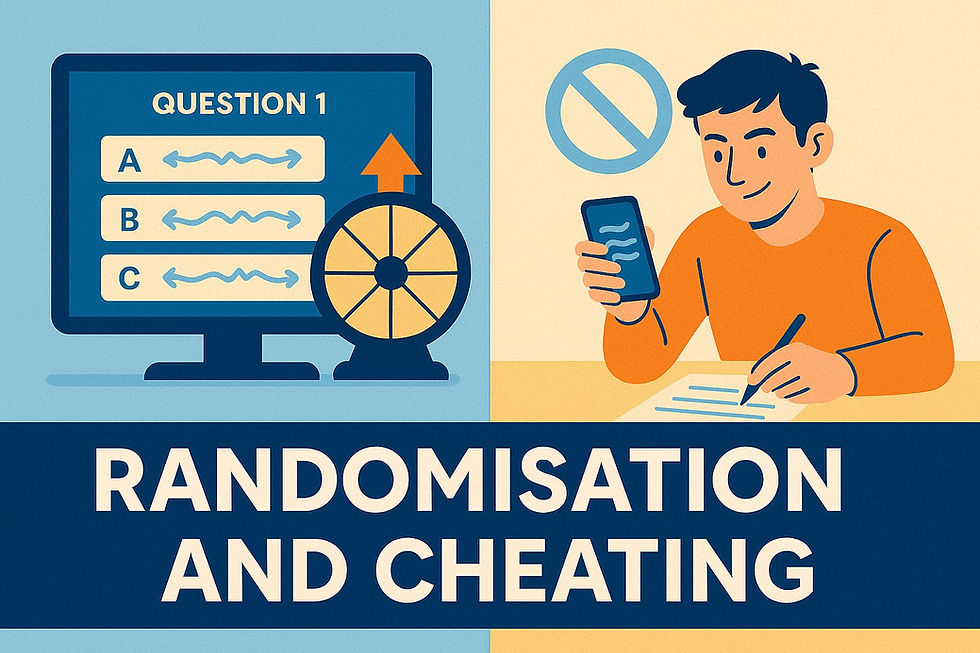Adaptive Testing vs Laureate’s Approach: Why We Chose a Better Model for Real-World English Assessment
- greenedugroup
- Nov 17, 2025
- 3 min read

In the world of digital assessment, adaptive testing has become a buzzword. Many testing platforms promote it as the most “advanced” way to measure language proficiency — but adaptive tests also come with significant limitations, fairness issues, and practical challenges for education providers.
At Laureate Online Testing, we deliberately chose not to use adaptive testing.Instead, our system uses a calibrated, multi-level, randomised model that gives every candidate a fair, balanced experience while providing institutions with highly reliable data.
Here’s why our approach is different — and why it’s better for the sectors we serve.
What Is Adaptive Testing?
Adaptive testing changes the difficulty of the next question based on whether the candidate got the previous one correct.
In theory, it sounds efficient:
Get a question right → next question gets harder
Get it wrong → next question gets easier
The algorithm keeps adjusting until it predicts the student’s level.
Where Adaptive Testing Works Well
Adaptive testing performs best in:
Large-scale, high-stakes exams
Very controlled testing environments
Highly trained test-takers
Situations where the goal is a quick estimate, not a broad skill diagnostic
But these conditions rarely match VET, ELICOS, CRICOS, pathway, or language-support contexts.
The Problems With Adaptive Testing
Despite the marketing, adaptive tests come with real drawbacks:
They can be unfair for nervous or unfamiliar candidates
If a learner answers the first few questions incorrectly (due to nerves, misunderstanding, or test anxiety), the algorithm drops them to an artificially low difficulty band — and often never fully recovers.
They reduce skill coverage
Because the test rapidly narrows the difficulty range, many core skills may not be sampled at all.
A learner might finish the entire test without:
Reading a medium-length text
Encountering certain grammar structures
Being tested on writing coherence
Completing a higher-order listening task
This creates gaps that affect placement accuracy.
They are opaque and hard to audit
Regulators, teachers, and institutions often cannot see:
How the difficulty jumps occurred
How many items were delivered at each level
Whether the algorithm behaved consistently
For compliance-driven sectors (like RTOs and CRICOS providers), this lack of transparency is a genuine problem.
They are easier to “game”
Adaptive tests can be tricked by:
Pattern guessing
Memorising question templates
Purposely answering early items wrong to avoid hard ones
This leads to unreliable scores.
They provide limited diagnostic information
Adaptive testing can tell you roughly “what level” someone is — but not why they’re at that level, or where they need improvement.
Why Laureate Does NOT Use Adaptive Testing
Laureate Online Testing was built for real education environments:
VET
CRICOS
ELICOS
University pathways
Corporate training
Foundation English
Skills-based placement and progression
These sectors need accuracy, fairness, transparency, and repeatability — not a black-box algorithm.
Our model provides exactly that.
The Laureate Model: Calibrated, Multi-Level, Randomised Testing
Instead of adapting mid-test, Laureate uses a smarter structure:
A large database of calibrated questions
Questions are written and graded across five difficulty levels (A1–C1 style, aligned to CEFR/IELTS benchmarks).
Each test automatically pulls a balanced sample
When a test is generated, the platform randomly selects an equal number of questions from each level.
Every test version is unique
Randomisation prevents memorisation and increases integrity.
Every learner is tested broadly, not narrowly
All macro skills — and all difficulty ranges — are sampled.
Scores reflect demonstrated ability, not algorithmic assumptions
This produces a clear, balanced picture of a learner’s strengths and weaknesses.
Easy to audit, easy to interpret
Institutions can see exactly:
Which question bank items were used
What difficulty bands were included
How marks were distributed
Consistent, repeatable, and fair for all candidates
No learner is punished or advantaged by how they answer early questions.
Why Our Approach Is Better for Real-World Teaching
Full coverage across all levels
You never miss important skills because the algorithm narrowed too fast.
Transparent for teachers, regulators, and auditors
Perfect for RTOs, CRICOS providers, NEAS review, and government audits.
More diagnostic information
You can see not only the level but also:
Grammar performance
Reading comprehension range
Listening accuracy across difficulty bands
Writing/speaking rubric performance
More stable and reliable
Adaptive testing can swing dramatically.Laureate’s method gives stable results across all cohorts.
Perfect for placement AND progression
Initial placement + ongoing monitoring both make sense with this structure.
So Which Method Is Actually Better?
It depends on the context.
Adaptive Testing
Good for:
Very large, high-stakes, single-score exams
Not ideal for:
Diagnostics
Language learning
VET
CRICOS
Placement
Low-stakes entry screening
Vulnerable cohorts
Fairness-driven environments
Laureate’s Multi-Level Randomised Testing
Good for:
Accurate diagnostics
Placement
Progress monitoring
Language learners of all levels
Fairness across cohorts
Compliance-heavy sectors
Transparent scoring
Repeatability and integrity
In short: Adaptive testing estimates a score. Laureate testing demonstrates a score.
We built Laureate Online Testing this way because it serves real classrooms, real trainers, and real learners — not abstract psychometric models.
Our approach is:
Fair
Transparent
Reliable
Auditable
Educationally meaningful
And most importantly:It gives institutions the data they actually need to support learners.




Comments